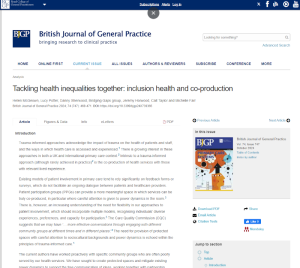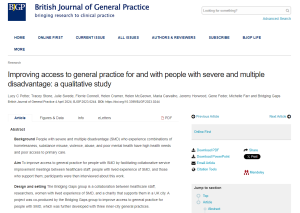From new GP specialist clinics to developing trauma-informed care – the impacts of Bridging Gaps
1 October 2024
New GP specialist clinics for people experiencing multiple health inequalities and training leaders from Integrated Care Systems to develop trauma-informed care are just two of the successes from ARC West’s Bridging Gaps project.
Bridging Gaps originally aimed to improve access to GP practices for people who have experienced trauma and have complex needs. Services often aren’t equipped to meet these needs, worsening already severe health inequalities.
Bridging Gaps was started by academic GP Lucy Potter and a group of Bristol women who have experienced trauma, including addiction, homelessness, mental health problems, sexual exploitation and street sex work, domestic and sexual violence, and poverty. The group have been meeting regularly since 2019, in partnership with One25, a charity that supports women who street sex work in Bristol.
Working alongside ARC West researcher Michelle Farr, professionals from One25, and GPs and researchers, the group has been improving access to primary care. They have collaborated with GP practices and GP trainees, improving access in 4 GP practices in Bristol.
This includes a specially co-designed clinic at Wellspring Healthy Living Centre in East Bristol, which has been running since 2020. Details about this work has been written up by the group in an academic paper. A similar model has been developed at Charlotte Keel Medical Practice in Bristol, learning from Wellspring with support from Bridging Gaps. Other GP practices are also asking for advice on how they can set up something similar. Additional service changes included developing care coordinator roles, patient lists to support access to patients in greater need, and an information sharing tool.
The group have also helped Bristol, North Somerset and South Gloucestershire Integrated Care System (BNSSG ICS) develop their approach to trauma-informed care. They’ve worked with the national organisation Pathway to present to and train ICS leaders in trauma-informed care. They have contributed to a NHS England online course: Working with people and communities to improve general practice in primary care. Recently they have contributed to Bristol City Council’s strategy for homelessness and their health needs assessment for street sex workers.
The women have also got involved in academic work. They have had two peer-reviewed papers published, with one group member named as a co-author. Others also contributed but wished to remain anonymous. They’ve just published an article on how health inequalities can be tackled together in primary care, working alongside different communities. They have also trained MSc students on participatory research. Bridging Gaps was awarded two Great Practice Awards 2020 for ‘Inspiring Change’ and facilitating ‘Independent Futures’ by Golden Key, a partnership to improve services for Bristol citizens with the most complex needs and the 2022 University of Bristol Open Research Prize in the category of Widening Reach.
In the last year, the group has overcome the impact of funding cuts at partner One25, who have been central to the success of Bridging Gaps. It was a devastating blow to the group when the support worker assigned to the project, was made redundant, and other services had to shut. However, the group have kept on despite this. Through everyone’s hard work, One25 have now taken on the management of the group as the lived experience voice of One25, so there is a sustainable future. There are new plans to support the development of One25, and initiate further research to improve support for women who street sex work.
Bridging Gaps members have shared their perspectives about being part of the group:
“Working alongside professionals in a co-production setting has given me a voice, and a sense of belonging. My voice matters. Being with other women who have experienced the same type of trauma as myself makes me feel less alone. I never used to like talking about my past but being in such a safe space gave me the confidence to speak out about the injustices I had been through. I have gained so many skills and made lasting friendships which I will always treasure. Thank you Bridging Gaps you are perfect in every way.”
“I would like to say that since being a part of Bridging Gaps, I have been on my own journey with recovery. The repetition of my trauma has been haunting me and I find myself lost at times with what direction I would like my future to take. I feel appreciated by my group which enables me to flourish and accept the past is not going to dictate my future. My experience working with the team continues to be a joy and the thought of being a part of the huge changes that continues to made feeds my soul. I appreciate the opportunity to aid others in their journey by my participation in the work we are doing now so they will have a good experience when accessing the support they need. I look forward to working with the team on upcoming projects.”
“I joined Bridging Gaps during Covid which was a time where we had to adapt ways of working which had its own challenges. Since joining I feel I’ve grown as a person. I can use my own experiences to help other people. That’s been therapeutic and empowering. We are taking control and not just being heard but actually making important changes. Our lived experience makes us valuable experts”
“Bridging Gaps has been there for me. I’ve met inspirational women who are my friends and I’ve learnt that no matter how small the change, that we are people that have a voice and we matter, no matter what happens, and that together we can make change happen.”
Michelle Farr, Senior Research Fellow at ARC West, said:
“Working with the women involved in Bridging Gaps has been so inspiring. They are an amazing group of trailblazers who are so determined to improve services for others. Making real changes in services has been hugely motivating for all of us. It’s been so rewarding to see how being involved in Bridging Gaps has also had a positive impact on everyone. It’s built people’s skills and confidence and made a real difference to their lives.”
Paper

Additional papers
